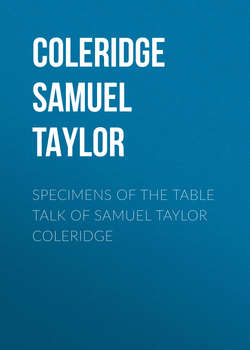Читать книгу Specimens of the Table Talk of Samuel Taylor Coleridge - Coleridge Samuel Taylor - Страница 64
TABLE TALK
June 4. 1830
ОглавлениеJEREMY TAYLOR.—ENGLISH REFORMATION
Taylor's was a great and lovely mind; yet how much and injuriously was it perverted by his being a favourite and follower of Laud, and by his intensely popish feelings of church authority.64 His Liberty of Prophesying is a work of wonderful eloquence and skill; but if we believe the argument, what do we come to? Why to nothing more or less than this, that—so much can be said for every opinion and sect,—so impossible is it to settle any thing by reasoning or authority of Scripture,—we must appeal to some positive jurisdiction on earth, ut sit finis controversiarum. In fact, the whole book is the precise argument used by the Papists to induce men to admit the necessity of a supreme and infallible head of the church on earth. It is one of the works which preeminently gives countenance to the saying of Charles or James II., I forget which:—"When you of the Church of England contend with the Catholics, you use the arguments of the Puritans; when you contend with the Puritans, you immediately adopt all the weapons of the Catholics." Taylor never speaks with the slightest symptom of affection or respect of Luther, Calvin, or any other of the great reformers—at least, not in any of his learned works; but he saints every trumpery monk and friar, down to the very latest canonizations by the modern popes. I fear you will think me harsh, when I say that I believe Taylor was, perhaps unconsciously, half a Socinian in heart. Such a strange inconsistency would not be impossible. The Romish church has produced many such devout Socinians. The cross of Christ is dimly seen in Taylor's works. Compare him in this particular with Donne, and you will feel the difference in a moment. Why are not Donne's volumes of sermons reprinted at Oxford?65
* * * * *
In the reign of Edward VI., the Reformers feared to admit almost any thing on human authority alone. They had seen and felt the abuses consequent on the popish theory of Christianity; and I doubt not they wished and intended to reconstruct the religion and the church, as far as was possible, upon the plan of the primitive ages? But the Puritans pushed this bias to an absolute bibliolatry. They would not put on a corn-plaster without scraping a text over it. Men of learning, however, soon felt that this was wrong in the other extreme, and indeed united itself to the very abuse it seemed to shun. They saw that a knowledge of the Fathers, and of early tradition, was absolutely necessary; and unhappily, in many instances, the excess of the Puritans drove the men of learning into the old popish extreme of denying the Scriptures to be capable of affording a rule of faith without the dogmas of the church. Taylor is a striking instance how far a Protestant might be driven in this direction.
64
Mr. Coleridge placed Jeremy Taylor amongst the four great geniuses of old English literature. I think he used to reckon Shakspeare and Bacon, Milton and Taylor, four-square, each against each. In mere eloquence, he thought the Bishop without any fellow. He called him Chrysostom. Further, he loved the man, and was anxious to find excuses for some weak parts in his character. But Mr. Coleridge's assent to Taylor's views of many of the fundamental positions of Christianity was very limited; and, indeed, he considered him as the least sound in point of doctrine of any of the old divines, comprehending, within that designation, the writers to the middle of Charles II.'s reign. He speaks of Taylor in "The Friend" in the following terms:—"Among the numerous examples with which I might enforce this warning, I refer, not without reluctance, to the most eloquent, and one of the most learned, of our divines; a rigorist, indeed, concerning the authority of the church, but a latitudinarian in the articles of its faith; who stretched the latter almost to the advanced posts of Socinianism, and strained the former to a hazardous conformity with the assumptions of the Roman hierarchy." Vol. ii. p. 108.—ED.
65
Why not, indeed! It is really quite unaccountable that the sermons of this great divine of the English church should be so little known as they are, even to very literary clergymen of the present day. It might have been expected, that the sermons of the greatest preacher of his age, the admired of Ben Jonson, Selden, and all that splendid band of poets and scholars, would even as curiosities have been reprinted, when works, which are curious for nothing, are every year sent forth afresh under the most authoritative auspices. Dr. Donne was educated at both universities, at Hart Hall, Oxford, first, and afterwards at Cambridge, but at what college Walton does not mention—ED.
